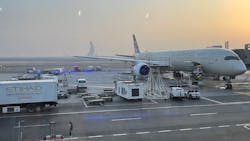Etihad Airways is putting a green foot forward with the launch of its new Airbus A350-1000 service.
The aircraft is designed with sustainability in mind as the airline puts diligent work into lessening the carbon footprint in its routes.
“This is going to be a generation challenge for aviation, not just a rocky two years or three years like a pandemic,” said Tony Douglas, CEO of Etihad Airways. “Nonetheless, it will probably be determined in the course of time who the winners and the losers are in commercial aviation.”
Etihad purchased the A350s in 2019, but the rollout was stalled by the pandemic. It’s putting five into service in the coming months on shorthaul service. It plans to eventually implement the aircraft in longhaul service to Chicago and New York later this year.
The inaugural flight took place March 31, from Abu Dhabi to Paris with media and dignitaries aboard. The Rolls-Royce Trent XWB-powered A350 is designed to be one of the most efficient aircraft types in the world, with 25% less fuel burn and CO2 emissions than previous-generation twin aisle aircraft.
“Literally, I can’t express how happy, how honored and proud I am to be here today because we're part of this extraordinary event of the first flight of the first A350 of Etihad Airways to Paris,” said Mikail Houari, president, Airbus Africa and Middle East.
The airline has a commitment to 12 A350-1000 with options for an additional eight. It will convert two of the options to put five of the aircraft progressively into service this year, as the travel sector recovers.
Douglas said Etihad is at 84% load factor across its network, which is greater than it was in 2019 at this point. However, Douglas said the airline is being cautious about market uncertainties, such as the cost of fuel. “What we look to do is map the way in which we take additional deliveries to the way in which the market continues to recover,” he said.
Etihad’s first A350 is named Sustainability50, a nod to its partnership with Rolls-Royce and Airbus and the goals of the aviation industry to reduce its carbon footprint. The companies will partner in the development and testing of technologies, procedures and initiatives to reduce carbon emissions.
Etihad embraced Boeing's Greenliner program, in which companies have a similar initiative with the 787 aircraft.
The A350 will be complementary to the Greenliner in the airline’s fleet, Douglas said. Etihad ran its most efficient flight in October with the Greenliner between London and Abu Dhabi, and avoided 64 tonnes of CO2e and was 72% more efficient than the same flight in 2019.
However, Douglas said those numbers were only made possible because the 2019 flight took place with an A380; the 2021 flight had 38% sustainable aviation fuel (SAF) aboard, which is much more expensive, the route was optimized with Eurocontrol, which took 40 minutes out of the flight time; and a technology company worked with them on a system to reduce contrails.
SAF is expensive and most airports lack the infrastructure to supply it, Douglas said, and route planning is going to take years to fix with government regulators.
“The Greenliner was almost a spokesperson to the challenge that we all have, be it for manufacturers, be it for airlines, be it for governments, policy setters, regulators or back to green loyalty, the consumer, the traveling public,” he said.
Etihad will continue efforts to lessen its carbon footprint and invest in equipment to make Sustainable50 possible in the industry. The launch of the aircraft is creating the pathway and the means with which the industry can collectively deliver upon that pledge to the benefit of mankind and for the climate, Douglas said.
“There is no one silver bullet out there, but the confidence that we have in this challenge is in no small part a consequence of having access to this incredible machine,” he said.
About the Author
Joe Petrie
Editor & Chief
Joe Petrie is the Editorial Director for the Endeavor Aviation Group.
Joe has spent the past 20 years writing about the most cutting-edge topics related to transportation and policy in a variety of sectors with an emphasis on transportation issues for the past 15 years.
Contact: Joe Petrie
Editor & Chief | Airport Business
+1-920-568-8399
>> To download the AviationPros media kits, visit: Marketing Resource Center
>>Check out our aviation magazines: Ground Support Worldwide | Airport Business | Aircraft Maintenance Technology

